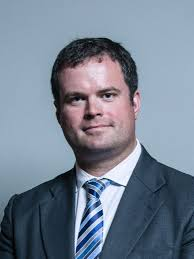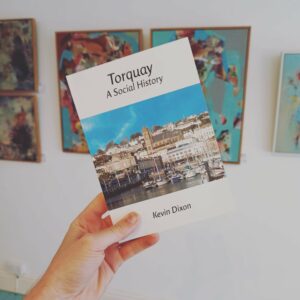On 4 July 2024 Liberal Democrat Steve Darling was elected as Member of Parliament for Torbay.
This was an atypical result as, for well over a century, Torquay had corresponded with other seaside resorts in that it generally sent Conservative Party candidates to Parliament.
There were a few early exceptions to this, national events always influencing local voting, but it was only during the late twentieth century that voting patterns changed to reflect the town’s evolving character.
From its early days Torquay was represented by Members for South Devon. In 1832 a Whig was elected; in 1835 a Conservative; 1849 Conservative; and in 1854 Conservative.
The Torquay Constituency was created in 1885.
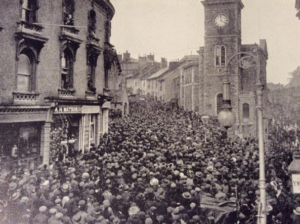
Enthusiastically waiting for the result of the 1910 election at the old Torquay Town Hall
That year it elected a Liberal Member of Parliament; 1886 Conservative; 1895 Conservative; 1900 Liberal; 1910 Liberal Unionist; 1912 Conservative; 1918 Conservative; 1922 Conservative; 1923 Liberal; 1924 Conservative; 1929 Unionist; 1931 Conservative; 1935 Conservative; 1945 Conservative; 1950 Conservative; 1951 Conservative; 1955 Conservative; 1959 Conservative; 1964 Conservative; 1966 Conservative; 1970 Conservative.
In 1974 the Torquay Constituency was abolished to become the Torbay Constituency. It was only in the very late twentieth century that Conservative rule was challenged.
In 1974 a Conservative was elected; 1979 Conservative; 1983 Conservative; 1987 Conservative; 1992 Conservative; 1997 Liberal Democrat; 2001 Liberal Democrat; 2005 Liberal Democrat; 2010 Liberal Democrat; 2015 Conservative; 2017 Conservative; 2019 Conservative; 2024 Liberal Democrat.
The Conservative Party was founded in 1834 from the Tory party and was one of two dominant political parties in the nineteenth century; the other being the Liberals. Under Benjamin Disraeli, The Conservatives played a preeminent role in politics at the height of the British Empire and was well established in Torquay, the leisure centre of that vast realm.
The Conservatives were a vote winning machine that could adapt to changes in the electorate. It did in 1885 to the extension of the franchise and redistribution of seats; in 1918 when women over 30 and men over 21 could vote; and in the ‘Flapper Election’ of 1929, when women aged 21 to 29 gained the franchise. And the party will likely refashion itself again after its recent defeat.
Despite the South West being a stronghold of the Liberal Party, for much of the nineteenth and twentieth centuries Torquay was a safe Conservative seat, giving the party significant majorities. Conservative dominance became an accepted fact in eighteen seaside resorts; as coalmining areas became natural Labour strongholds.
Indeed, there was an old witticism that “the Tory vote was weighed in ‘Torybay’.”
Sir Frederic Bennett, Torquay’s, and then Torbay’s, MP between 1955-87
Taking one example, at the 1959 General Election the Conservatives’ Sir Frederic Bennett received 29,527 votes against Labour’s William Cooper on 11,784; with the Liberal candidate Thomas Kellock at 10,685.
Alongside the election of candidates, we have other more recent indicators of local feeling and coastal difference. For instance, seaside areas voted heavily for Brexit in 2016, with 83% of coastal seats voting leave, compared with 66% inland. Torbay voted 27,935 Remain to 47,889 Leave.
 In the 2016 Referendum on Europe Torbay voted 27,935 Remain to 47,889 Leave.
In the 2016 Referendum on Europe Torbay voted 27,935 Remain to 47,889 Leave.
It wasn’t until after the Second World War that local government elections in Torquay began to be fought by political parties. Most councillors were, at least on paper, independents. Nevertheless, interest groups formed amongst councillors, indicating fault lines in the town that continue to this day. On one side, factions coalesced around the holiday industry and businesses; on the other, residents and the retired. 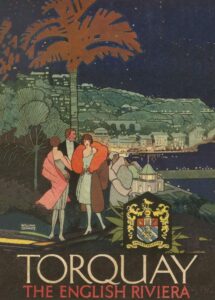
Inter-war Torquay had four groups competing for political influence
During the inter-war period Torquay had four groups which vied for control of the council, only one seeing itself as being a part of the national political landscape.
They were: ‘the Hotel Party’, centred on the Hoteliers Association; a faction which demanded low rates; the advocates of a distinctive and elite tourist season; and the Labour Group.
Then during the 1930s the Ratepayers Association and the 800-strong Citizens League emerged to offer a more coordinated front to promote the interests of residents. Giving support was the Torquay Times.
It was only after the Second World War that party politics began to enter Torquay’s Council Chamber.
In 1945 Torquay Council had thirty-five independents and a single Labour councillor. In response to this minor incursion, the Conservatives began to put up official candidates in 1947. The Liberals followed and began to win council seats from 1958 onwards.
Regardless of disagreements on direction, and especially expenditure, Torquay’s politics was always dominated by the interests of the town’s core industry of tourism. A broad coalition of interests would promote and defend this industry, from the great hotels to the smallest guest house.
The early twentieth century had seen the town moving on from its origins as the exclusive province of a few landowning families. These dynasties, the Carys, Palks and Mallocks, had transformed a collection of rural hamlets into the richest town in England. But even before the Great War the political and economic authority of the aristocracy and the gentry had considerably diminished.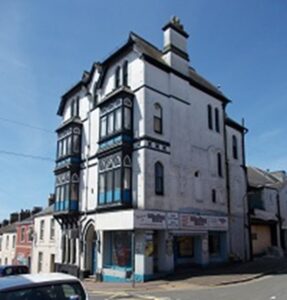
Creating Torquay’s middle class; Torre’s Constitutional and later Conservative Club
Following the national trend, this saw a transfer of power and ownership in favour of the middle classes. We still have Torre’s Conservative Club illustrating middle-class ambition and influence in the growing townscape.
During the twentieth century class became the major factor in the politics of Britain’s urban areas, usually employers’ interests challenged by a working-class labour movement.
Torquay, in variance, saw issues contested within the middle class, the town’s working class being mostly excluded from ongoing debates about the town.
Dominating local political discourse and the economy were: a generally affluent and large middle class; an above-average elderly population; the power of hoteliers; deference-generating service occupations; and small businesses relying on networking and personal contacts in a small town.
Low-paid, casual, and seasonal work in the tourism sector made trades unions difficult to organise and an alternative labour tradition failed to fully develop.
This was in distinct contrast to towns of a comparable size with a more traditional industrial base. Consequently, this restricted the development of the Labour Party which did establish a strong base in Exeter and Plymouth. It may have also diverted local social activists away from traditional politics into other radical traditions, religious movements or, in some cases, the esoteric and occult.
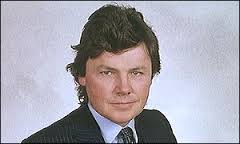 The flamboyant Conservative Rupert Allason MP 1987-97
The flamboyant Conservative Rupert Allason MP 1987-97
It was in the late twentieth century that Torquay’s fortunes began to change.
Tourism in all traditional seaside destinations experienced long-term decline as affordable air travel arrived in the 1980s. This eroded the political and social base of those in power for over a century. Gradually voting patterns then began to shift.
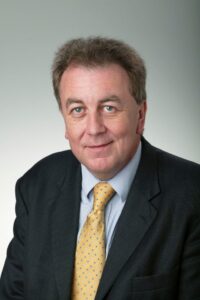 In 1997 Liberal Democrat Adrian Sanders MP ended Conservative dominance in the Bay after 74 years
In 1997 Liberal Democrat Adrian Sanders MP ended Conservative dominance in the Bay after 74 years
Communities close to the coast are now poorer, with more crime than their inland neighbours, and some of the worst health outcomes in the country. The Bay has more benefit claimants than communities in inland Devon. We also have an ageing population. Torbay’s average age is 49, compared to a national average of 40.
Longstanding trends towards a polarisation of wealth and disadvantage have accelerated. We now have £3 million homes alongside some of the poorest housing in the nation. The gap between coastal areas and the rest of the nation has also been growing more rapidly since the 2008 financial crisis and Covid.
We see this most clearly in incomes. The median annual wage in Torbay is £27,116. That’s the third lowest in the UK, behind only Oadby and Wigston in Leicestershire (£24,337) and Hastings in Sussex (£26,396). Devon’s best-paid workers are in Exeter, 24 miles away, where the wage is £33,375; £7,000 higher than it is in the Bay.
In 1997 Liberal Democrat Adrian Sanders MP ended Conservative dominance in the Bay after 74 years.
In 2015 Kevin Foster returned the Bay to Conservative control
Then in 2015 Kevin Foster returned the Bay to Conservative control until 2024 when Steve Darling won the seat for the Liberal Democrats. Whether the Bay comntuinues to switch between Conservative and Liberal Democrat, or perhaps we see another party emerging, remains to be seen.
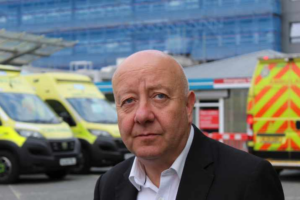 On 4 July 2024 Liberal Democrat Steve Darling was elected as Member of Parliament for Torbay
On 4 July 2024 Liberal Democrat Steve Darling was elected as Member of Parliament for Torbay
Torquay began as a health and leisure resort but is now changing rapidly in terms of its economy, culture, ethnicity, and the life chances of its residents. Whether the town remains as a primarily tourist resort, or has already become another type of community, is open to debate. Its politics, as an expression of how people feel about their lives, their hopes and their fears, are an expression of that change.
Torquay: A Social History by local author Kevin Dixon is available for £10 from Artizan Gallery, Fleet Street, Torquay, or:
https://www.art-hub.co.uk/product-page/torquay-a-social-history-by-kevin-dixon



